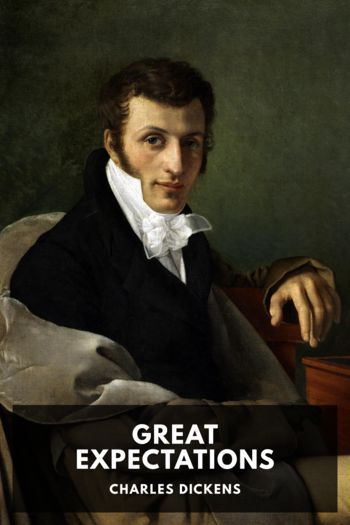Great Expectations - Charles Dickens (read books for money txt) 📗

- Author: Charles Dickens
Book online «Great Expectations - Charles Dickens (read books for money txt) 📗». Author Charles Dickens
It fell out as Wemmick had told me it would, that I had an early opportunity of comparing my guardian’s establishment with that of his cashier and clerk. My guardian was in his room, washing his hands with his scented soap, when I went into the office from Walworth; and he called me to him, and gave me the invitation for myself and friends which Wemmick had prepared me to receive. “No ceremony,” he stipulated, “and no dinner dress, and say tomorrow.” I asked him where we should come to (for I had no idea where he lived), and I believe it was in his general objection to make anything like an admission, that he replied, “Come here, and I’ll take you home with me.” I embrace this opportunity of remarking that he washed his clients off, as if he were a surgeon or a dentist. He had a closet in his room, fitted up for the purpose, which smelt of the scented soap like a perfumer’s shop. It had an unusually large jack-towel on a roller inside the door, and he would wash his hands, and wipe them and dry them all over this towel, whenever he came in from a police court or dismissed a client from his room. When I and my friends repaired to him at six o’clock next day, he seemed to have been engaged on a case of a darker complexion than usual, for we found him with his head butted into this closet, not only washing his hands, but laving his face and gargling his throat. And even when he had done all that, and had gone all round the jack-towel, he took out his penknife and scraped the case out of his nails before he put his coat on.
There were some people slinking about as usual when we passed out into the street, who were evidently anxious to speak with him; but there was something so conclusive in the halo of scented soap which encircled his presence, that they gave it up for that day. As we walked along westward, he was recognized ever and again by some face in the crowd of the streets, and whenever that happened he talked louder to me; but he never otherwise recognized anybody, or took notice that anybody recognized him.
He conducted us to Gerrard Street, Soho, to a house on the south side of that street. Rather a stately house of its kind, but dolefully in want of painting, and with dirty windows. He took out his key and opened the door, and we all went into a stone hall, bare, gloomy, and little used. So, up a dark brown staircase into a series of three dark brown rooms on the first floor. There were carved garlands on the panelled walls, and as he stood among them giving us welcome, I know what kind of loops I thought they looked like.
Dinner was laid in the best of these rooms; the second was his dressing-room; the third, his bedroom. He told us that he held the whole house, but rarely used more of it than we saw. The table was comfortably laid—no silver in the service, of course—and at the side of his chair was a capacious dumbwaiter, with a variety of bottles and decanters on it, and four dishes of fruit for dessert. I noticed throughout, that he kept everything under his own hand, and distributed everything himself.
There was a bookcase in the room; I saw from the backs of the books, that they were about evidence, criminal law, criminal biography, trials, acts of Parliament, and such things. The furniture was all very solid and good, like his watch-chain. It had an official look, however, and there was nothing merely ornamental to be seen. In a corner was a little table of papers with a shaded lamp: so that he seemed to bring the office home with him in that respect too, and to wheel it out of an evening and fall to work.
As he had scarcely seen my three companions until now—for he and I had walked together—he stood on the hearthrug, after ringing the bell, and took a searching look at them. To my surprise, he seemed at once to be principally if not solely interested in Drummle.
“Pip,” said he, putting his large hand on my shoulder and moving me to the window, “I don’t know one from the other. Who’s the Spider?”
“The spider?” said I.
“The blotchy, sprawly, sulky fellow.”
“That’s Bentley Drummle,” I replied; “the one with the delicate face is Startop.”
Not making the least account of “the one with the delicate face,” he returned, “Bentley Drummle is his name, is it? I like the look of that fellow.”
He immediately began to talk to Drummle: not at all deterred by his replying in his heavy reticent way, but apparently led on by it to screw discourse out of him. I was looking at the two, when there came between me and them the housekeeper, with the first dish for the table.
She was a woman of about forty, I supposed—but I may have thought her younger than she was. Rather tall, of a lithe nimble figure, extremely pale, with large faded eyes, and a quantity of streaming hair. I cannot say whether any diseased affection of the heart caused her lips to be parted as if she were panting, and her face to bear a curious expression of suddenness and flutter; but I know that I had been to see Macbeth at the theatre, a night or two before, and that her face looked to me as if it were all disturbed by fiery air, like the faces





Comments (0)